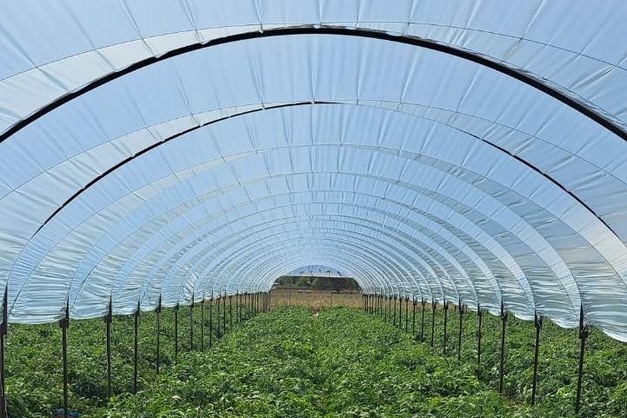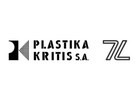Greenhouse film manufacturer Plastika Kritis has recently introduced the SunCooler® range of cooling films to meet the needs of warm climates. "Using nanotechnology and advanced Near-IR additives that absorb and dissipate heat, Plastika Kritis has managed to maintain high levels of light transmission while significantly reducing heat loads inside the greenhouse and on the soil", says Dimitris Doukas of Plastika Kritis. He says growers in Morocco, Spain, Mexico, and Greece are reporting great results after the first summer season of using SunCooler films, as the product roll-out continues through Plastika Kritis' global distribution network.

Modern polyethylene greenhouse covers play a crucial role in creating a favorable environment for optimal plant growth and production. They offer several benefits, including long lifespan, thermal insulation, and high light transmission. These features can be combined with advanced properties such as light diffusion, disease control, and anti-dripping properties, making them an essential tool for optimizing growing conditions and enhancing productivity across various crops and climates. "The choice of film is critical not only for maximizing economic benefits but also for preventing undesirable effects, especially in sensitive crops. Our EVO AC anti-dripping films are a great example of this, and we believe that SunCooler® will be the same!" says Dimitris.
Near Infra-Red radiation
In warm climates or during warm periods of the year, growers need to reduce heat loads inside the greenhouse while maintaining the highest possible light transmittance. Excessive heat can have a negative impact on plant growth, quality, and yield. Dimitris explains how temperature rise in the greenhouse during daytime is caused predominantly by the part of the solar spectrum known as Near Infra-Red radiation (NIR).
"In most commercial films with cooling properties, until today, cooling was achieved by reducing the transmittance of the film across the solar spectrum. As a result, the range of the solar spectrum necessary for plant growth and development is significantly reduced leading to insufficient light conditions for photosynthesis.", he says. "It is equally important that the film can limit high temperatures during daytime while minimizing any impact on the light needed for photosynthesis. This leads to an environment ideal for promoting plant growth while also providing more comfortable conditions for workers, thereby increasing operational productivity. Several years ago, Plastika Kritis was the first to introduce Silver Cooling films to tackle this challenge, but the ratio of light transmittance to NIR reduction wasn't as effective as we need it to be in very hot climates." With this need in mind, Plastika Kritis designed the SunCooler to achieve greater heat-blocking effect during the daytime. "Crops that are sensitive and require controlled environments for optimal growth will benefit the most. This includes a wide range of vegetables, fruits, and flowers that thrive in greenhouse conditions."
Custom versions
SunCooler films can be produced in custom versions with different levels of Photosynthetic Active Radiation (PAR) and Near Infra-Red (NIR) transmission to achieve the optimum combination to fit the needs of different areas and crops. According to Dimitris, SunCooler films help growers achieve optimal growing conditions. "By maintaining the temperature within an ideal range for photosynthesis, respiration, and nutrient uptake, plants can grow without stress, resulting in healthier and more vigorous crops." The cooling property, depending on the climate needs, can be also combined with Plastika Kritis flagship technology EVO AC to achieve superior condensation and humidity management. Then, there's the improved quality and yield. "Optimizing growing conditions in warm periods, improves the overall quality of crops, by preventing heat damage, such as fruit cracking or sunburns leading to higher yields of marketable products." Dimitris points out that high temperatures also affect workers' productivity. "In many areas of the world workers experience discomfort, or even pause work during peak heat hours. By reducing the temperature, we can create a safer and more pleasant working environment inside the greenhouse." Excessive heat also increases the demand for irrigation water, which is becoming scarce due to climate change. SunCooler can help improve water efficiency since in a cooler environment, the rate of evaporation from both the plants and the soil is reduced, ensuring that plants retain the necessary moisture. By reducing the need for irrigation and energy from cooling systems the overall operational costs of the greenhouse are also reduced, making the greenhouse operation more sustainable.
Extending the growing season
Lastly, Dimitris mentions that by using SunCooler, the growing season can be extended by preventing overheating during the warm season. "This enables year-round production in climates that would otherwise be too hot for growing certain crops, especially during summer. SunCooler can be a solution for growers seeking to respond to climate challenges and to create a more sustainable, cost-efficient, greenhouse operation. At Plastika Kritis, we continue to lead innovation in the greenhouse film industry, with research and development that always focuses on grower needs. I'm excited to announce that there are three new products our team has under development and that we will be launching soon", Dimitris concludes.
For more information:
Plastika Kritis
[email protected]
www.plastikakritis.com
